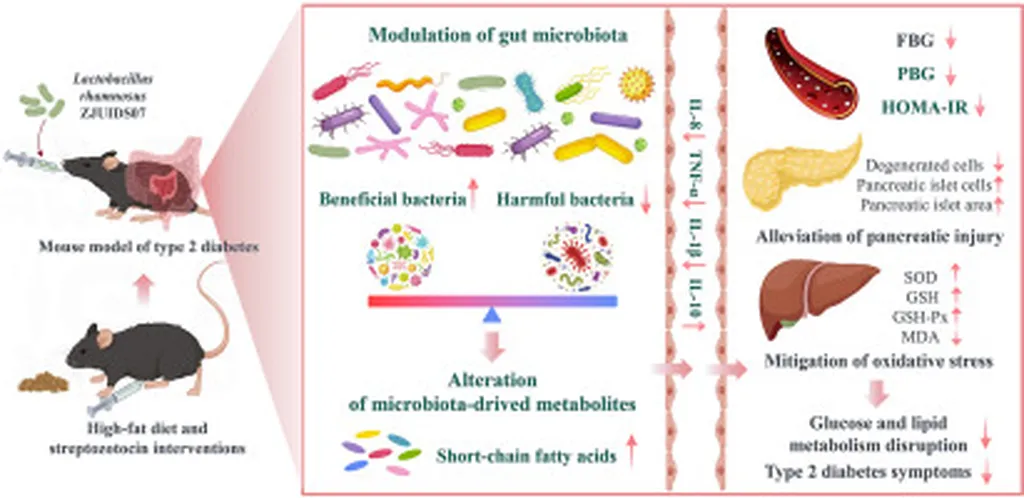In a groundbreaking study published in the journal *mSystems* (which translates to “Microbiome Systems”), researchers from the Inner Mongolia Agricultural University have uncovered a promising avenue for managing type 2 diabetes mellitus (T2DM) through the gut-liver axis. The study, led by Yecheng Gao of the Inner Mongolia Key Laboratory of Dairy Biotechnology and Engineering, explores the impact of multi-strain probiotic supplementation on carbohydrate and lipid metabolism in a T2DM rat model.
Type 2 diabetes is a pervasive chronic metabolic disorder that affects millions worldwide, characterized by dysregulation of carbohydrate, protein, and lipid metabolism. The study involved 32 rats randomly assigned to four groups: a control group, a T2DM model group, a low-dose probiotics group, and a high-dose probiotics group. The probiotic treatment consisted of three Lacticaseibacillus species and one Bifidobacterium species.
The results were striking. “The treatment with multi-strain probiotics resulted in a significant improvement in blood glucose and lipid profiles in T2DM rats, with the highest dosage demonstrating the most pronounced effects,” said Yecheng Gao, the lead author of the study. The probiotic intervention not only modulated the gut microbiota composition and diversity but also enriched potentially beneficial bacterial species and altered gut metabolic modules and carbohydrate-active enzyme profiles.
One of the most intriguing findings was the role of fecal short-chain fatty acids and serum bile acids as pivotal mediators for crosstalk between hepatic and gut transcriptomic pathways. This suggests that probiotics could play a crucial role in managing T2DM by modulating key metabolic pathways through the gut-liver axis.
The implications of this research are far-reaching. For the energy sector, understanding the metabolic pathways influenced by probiotics could open new avenues for developing targeted therapies that improve metabolic health. This could lead to more effective management of diabetes-related complications, reducing the burden on healthcare systems and improving the quality of life for millions of people.
As Yecheng Gao noted, “This study offers novel insights into the role of probiotics in managing T2DM via the gut-liver axis, emphasizing the potential of probiotic therapy in modulating key metabolic pathways.” The findings could pave the way for future research and commercial applications, potentially revolutionizing the way we approach diabetes management.
Published in *mSystems*, this study highlights the importance of interdisciplinary research in uncovering new therapeutic strategies for chronic metabolic disorders. The results not only advance our understanding of the gut-liver axis but also offer hope for more effective and targeted treatments for type 2 diabetes.

